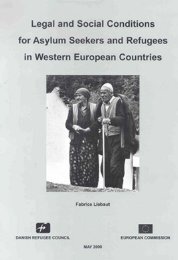Bulgaria - The social impact of seasonal migration
Bulgaria - The social impact of seasonal migration
Bulgaria - The social impact of seasonal migration
You also want an ePaper? Increase the reach of your titles
YUMPU automatically turns print PDFs into web optimized ePapers that Google loves.
In 1994, a new category <strong>of</strong> immigrants was introduced into <strong>Bulgaria</strong>n legislation -<br />
refugees and people with humanitarian status <strong>of</strong> different duration, and the first statuses<br />
based on the Decree for Granting and Regulating the Refugee Status were given in 1995.<br />
From 1993 until 1 January 2003, a total <strong>of</strong> 11 253 persons (7 601 men, 1 748 women and<br />
1 904 children) applied for refugee status. <strong>The</strong>y came from 72 states, but most <strong>of</strong> all from<br />
Afghanistan, Iraq, Armenia, Yugoslavia and Iran. Of all the applicants, 1 356 persons<br />
(including 327 children) were granted refugee status according to the Geneva<br />
Convention <strong>of</strong> 1951. 24% <strong>of</strong> them are aged up to 17, and 76% are <strong>of</strong> 18-59 years <strong>of</strong> age.<br />
Humanitarian protection was granted to 2 668, people, <strong>of</strong> whom 595 children and 245<br />
women.<br />
III. <strong>The</strong> main factors for e<strong>migration</strong> are economic - the relatively high level <strong>of</strong><br />
unemployment in <strong>Bulgaria</strong> and the low standard <strong>of</strong> living. In the last two years, the<br />
<strong>of</strong>ficial statistic has registered a relative economic growth, as well as decreasing<br />
unemployment. If this trend continues in the future, it will probably stabilize <strong>migration</strong>,<br />
too. Potential and real migrants are oriented more to <strong>seasonal</strong> <strong>migration</strong>. Signing bilateral<br />
agreements will regulate this process and will prevent irregular <strong>migration</strong> in large numbers.<br />
<strong>The</strong> practice has shown that after the term <strong>of</strong> employment contracts abroad expires, the<br />
<strong>Bulgaria</strong>n workers return to the territory <strong>of</strong> <strong>Bulgaria</strong>.<br />
<strong>The</strong>re is a process <strong>of</strong> strengthening the control over and the struggle against trafficking<br />
in human beings which is another factor that will reduce in the future the illegal<br />
channels <strong>of</strong> e<strong>migration</strong>.<br />
Another important factor for e<strong>migration</strong> is the already created networks <strong>of</strong> relatives and<br />
friends, the diasporas, which will provoke and maintain a relatively stable flow <strong>of</strong><br />
emigrants. But at the moment, most <strong>of</strong> these networks function as a means for coping<br />
with current difficulties, i.e. they are oriented more to <strong>seasonal</strong> rather than to<br />
permanent <strong>migration</strong>.<br />
As for immigrants and refugees, there have been transformations in their <strong>social</strong> pr<strong>of</strong>ile in the<br />
last couple <strong>of</strong> years. <strong>The</strong> push factors for im<strong>migration</strong> are more related to the economic<br />
conditions in their countries rather than to the political situation there.<br />
IV. <strong>The</strong> <strong>impact</strong> <strong>of</strong> e<strong>migration</strong> upon the <strong>Bulgaria</strong>n society is ambivalent, having<br />
both positive and negative consequences.<br />
<strong>The</strong> first positive <strong>impact</strong> is related to the growing size <strong>of</strong> remittances. For the period<br />
January-November 2002, current transfers from <strong>Bulgaria</strong>ns living abroad amounted to<br />
449.6 million USD, surpassing the amount <strong>of</strong> direct foreign investments by 20.9 million<br />
USD and making 2.9% <strong>of</strong> GDP. Thus for the 11 months <strong>of</strong> last year, the remittances were<br />
56.67 USD per person. According to the data <strong>of</strong> the <strong>Bulgaria</strong>n National Bank, remittances<br />
surpassed by far the financial help coming from the EC pre-accession funds, which for<br />
January-November 2002 amounted to 100.8 million USD.<br />
<strong>The</strong> second positive <strong>impact</strong> concerns the cultural lessons learned from <strong>seasonal</strong> work abroad<br />
related to a new organisation <strong>of</strong> work and life, and producing a new worldview<br />
83

















